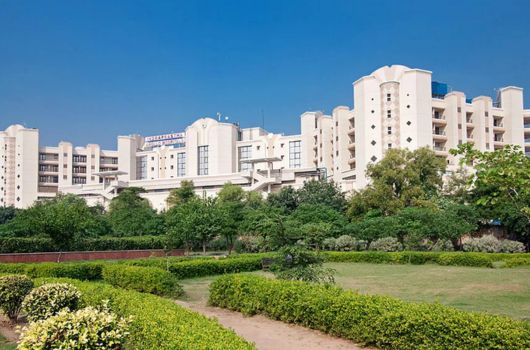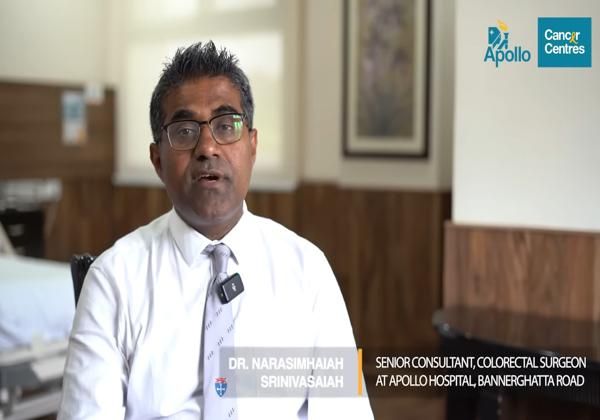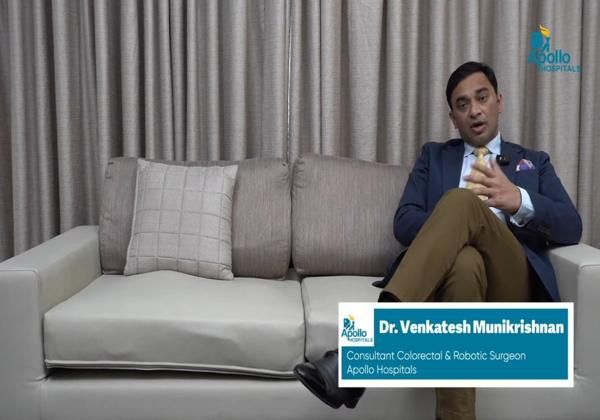An anal tumour is an abnormal growth that develops in or around the anal canal, the short passage at the end of the rectum. While most anal tumours are cancerous (anal cancer), some can be benign.
Benign tumours such as anal papillomas, polyps, skin tags, and genital warts (condyloma acuminatum) can also develop in this area. These benign growths are usually non-cancerous but may sometimes require treatment or monitoring.
Anal tumours often begin as small changes in cells, usually triggered by infections like HPV (human papillomavirus). If left untreated, these abnormal cells can grow and spread to nearby tissues. Many people confuse the early signs with common conditions like piles, which leads to delayed diagnosis.
A common myth is that diagnostic tests like anoscopy or biopsy are extremely painful, but they are usually quick, done with care, and can be life-saving when they detect the tumour early.
Understanding anal tumours, their risk factors, early warning signs, and available treatments can help patients make informed decisions. With timely diagnosis, anal tumours are treatable, and many patients go on to live full, healthy lives.
People need anal tumour treatment to remove or destroy abnormal cells, prevent the tumour from spreading, and improve long-term survival. Without proper care, both benign and cancerous anal tumours can cause complications which makes treatment more difficult. When diagnosed early, treatment for anal tumours is often very effective, helping to preserve normal bowel function and reduce the risk of the tumour returning.
The exact causes of anal tumours may not always be clear, but several factors are strongly linked to an increased risk:
Symptoms of anal tumours can be subtle at first and are often mistaken for common conditions like haemorrhoids (piles) or minor skin irritations. Recognising these warning signs early can help with faster diagnosis and more effective treatment. Common symptoms include:
Because these symptoms can be caused by both benign and malignant anal tumours, medical evaluation is important for proper diagnosis and treatment.
These symptoms lead to treatment once medical tests confirm the presence of an anal tumour, whether it is cancerous or an abnormal growth that could become cancerous. Early detection is crucial for starting appropriate treatment promptly and improving the chances of a successful outcome.
Early detection of anal tumours can make a significant difference. If a tumour is suspected, your doctor may recommend the following tests:
While not all cases of anal cancer can be prevented, certain lifestyle changes and medical precautions can significantly reduce your risk. Doctors and experts recommend the following steps:
If you experience any of these symptoms for more than a few weeks, it is important to seek medical advice. Early diagnosis and treatment offer the best outcomes, especially if the cancer is detected before it spreads. Bangla Health Connect can help you connect with specialists at Apollo Hospitals for timely and expert care.
.png)
India is a preferred destination for anal tumour treatment, especially for Bangladeshi patients seeking trusted, affordable, and expert care. Each year, many families choose India for safe and timely treatment.
Key reasons to choose India:
India offers the right mix of expert oncologists, advanced treatment options, affordable costs, and patient-friendly services for anal cancer care. Compared to other countries, patients receive the same high-quality treatment in India at a much more reasonable price.
Contact Bangla Health Connect today to connect with leading Indian hospitals, book an appointment with a specialist, or get a trusted second opinion.
Apollo Hospitals is one of India's leading healthcare providers for anal tumour treatment. Here are some of their top centres:
.jpg)

.jpg)





Apollo Hospitals in India offers world-class medical services supported by advanced technology and a team of experienced specialists across all major disciplines. It is also known for offering easy medical care for international patients, with help in language, travel, and stay.
Anal tumour treatment in India is significantly more affordable compared to countries like the US or UK. The average cost ranges from ₹1,00,000 to ₹2,00,000 (approximately $1,200 to $2,500). The final cost may vary based on multiple factors such as the treatment method, hospital location, and type of tumour. Before viewing the detailed table of treatment-wise costs, it's helpful to understand what influences these expenses most.
Several factors can affect the total cost of anal tumour treatment:
Note - The costs listed are approximate and may vary based on hospital, location, and patient needs. Consult the healthcare provider for accurate and updated information.
The currency conversion rates in the table above are based on data from July 2025.
For a detailed breakdown and more information on treatment expenses, you can contact Bangla Health Connect for treatment costs at Apollo Hospitals in India.
According to Cancer Research UK, the 5-year survival rate for anal cancer is almost 90% for stage 1 and more than 75% for stage 2, showing excellent outcomes when detected early. Around 60% of stage 3 patients survive five years or more, while stage 4 survival drops to about 20%. Overall, more than 60% of all anal cancer patients survive at least five years after diagnosis, highlighting the importance of early detection and timely treatment.
Success in anal tumour treatment means the tumour is effectively controlled or removed, allowing the patient to return to a normal or near-normal life.
Apollo Hospitals has successfully treated thousands of anal tumour patients with excellent outcomes. It is known for:

Dr. Narasimhaiah Srinivasaiah, Senior Consultant in the Department of Colorectal Surgery at Apollo Hospitals Bangalore, highlights that anal cancer, though rare, is often misdiagnosed as piles or warts. He explains that anal cancer can cause bleeding, itching, lumps, and anaemia. Risk factors include age, HIV, immunosuppression, and HPV. Early diagnosis through examination and biopsy is crucial. He noted that while early-stage cases are usually managed with chemotherapy and radiotherapy, advanced cases may require surgery, including removal of the anal canal. He urges prompt medical attention for any back passage issues to improve outcomes.

Dr. Venkat Munikrishnan, Senior Consultant Colorectal Surgeon at Apollo Hospitals, Chennai, shares key insights on colorectal cancer, a disease that affects the colon, rectum, or anus. He explains that it often starts as harmless polyps in the large intestine, which can take nearly a decade to turn cancerous. Early symptoms such as rectal bleeding, persistent changes in bowel habits, unexplained weight loss, anaemia, or an abdominal lump should not be ignored, especially if they persist beyond six weeks. According to Dr. Munikrishnan, with early detection, colorectal cancer is highly treatable, and outcomes can be significantly improved through timely medical intervention and structured follow-up care.
Apollo Hospitals offers advanced and comprehensive treatment for anal cancer with expert multidisciplinary care.
Bangla Health Connect helps Bangladeshi patients get safe and fast anal tumour treatment in India. The team works closely with Apollo Hospitals to make every step simple and stress-free.
Bangla Health Connect makes this process simple and supportive, from travel arrangements to ongoing medical guidance, ensuring Bangladeshi patients receive high-quality care with peace of mind. With over 60,000 Bangladeshi patients assisted, Bangla Health Connect has built strong trust through clarity, care, and personal support.
Contact Bangla Health Connect today to begin your treatment journey with trusted support every step of the way.
Note: Bangla Health Connect does not provide medical advice of any kind.
✅ Share your reports
✅ Get treatment plans from Apollo Hospitals
✅ Choose the one that fits you
✅ Let us handle the rest
An anal tumour is an abnormal growth that develops in the tissues of the anus. It may be benign or cancerous, but it often begins as abnormal cells that multiply and form a mass. While some tumours remain non-cancerous, others can develop into anal cancer if left untreated. Early detection and timely treatment greatly improve outcomes and help prevent complications.
Yes, anal tumours are highly curable, especially when diagnosed early. Treatments like chemoradiation and surgery have excellent success rates, allowing many patients to live normal lives after treatment. Your doctor will guide you the best.
Anal tumour is diagnosed through physical exams, anoscopy, biopsy, imaging tests such as MRI or CT scans, and sometimes blood tests. Early symptoms like bleeding or pain should prompt medical evaluation.
Recovery time after anal tumour treatment varies depending on the type of tumour and the treatment used. Most patients recover within 4 to 8 weeks following procedures like surgery or chemoradiation. Early-stage tumours may require shorter recovery, while more complex cases may take longer.
While anal tumours cannot always be completely prevented, the risk of developing them, especially cancerous ones, can be reduced. Getting vaccinated against HPV, practising safe sex, quitting smoking, maintaining good anal hygiene, and attending regular health checkups play a key role in prevention.
Yes. Bangla Health Connect offers comprehensive support, including doctor consultations, visa help, hospital admission, treatment planning, travel arrangements, and ongoing assistance.

